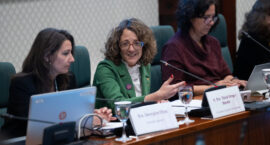
This month, citizens across Europe headed to the polls to vote for their representatives to European Parliament. Representatives are directly elected by voters in E.U. member states every five years, and European Parliament is responsible for passing a wide array of laws, including human rights and equality measures.
Far-right parties made significant gains, even going so far as to elect representative from neo-fascist parities. This will mean substantial setbacks in gender equality. In the past, far-right parties have cut funding for tackling gender-based violence, restricted access to reproductive healthcare and abortion, and suppressed speech around gender equality issues and LGBTQ+ rights.











